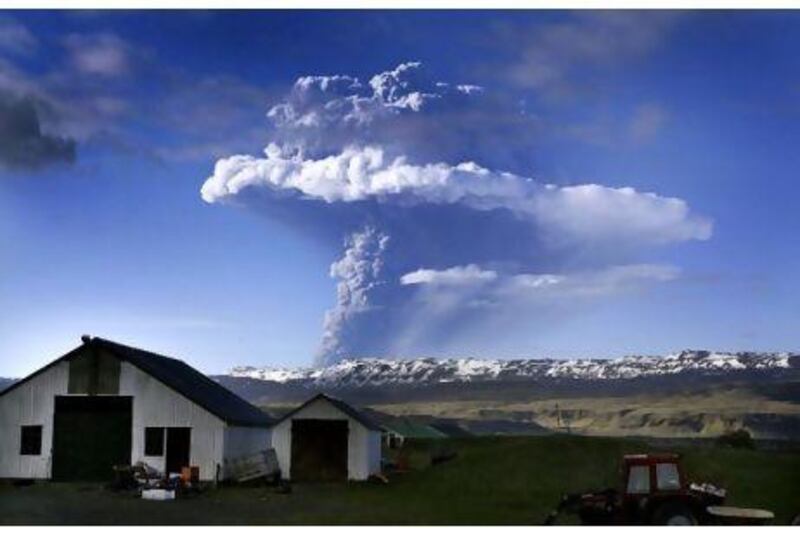REYKJAVIK // Iceland closed its main international airport and cancelled all domestic flights yesterday as a powerful volcanic eruption sent a plume of ash, smoke and steam 20 kilometres into the air.
The eruption of the Grimsvotn volcano was far larger than one a year ago at another Icelandic volcano that upended travel plans for 10 million people around the world, but scientists said it was unlikely to have the same widespread effect.
A University of Iceland geophysicist, Magnus Tumi Gudmundsson, said this eruption, which began Saturday, was Grimsvotn's largest eruption for 100 years.
It was "much bigger and more intensive than Eyjafjallajokull", the volcano whose April 2010 eruption shut down airspace across Europe for five days, he said.
"There is a very large area in south-east Iceland where there is almost total darkness and heavy fall of ash," he said. "But it is not spreading nearly as much. The winds are not as strong as they were in Eyjafjallajokull."
He said this ash is coarser than last year's eruption, falling to the ground more quickly instead of floating vast distances.
The ash plunged areas near the volcano into darkness yesterday and covered buildings, cars and fields in a thick layer of grey soot. Civil protection workers urged residents to wear masks and stay indoors.
Iceland's air traffic control operator said the Keflavik airport, the country's main hub, would be closed for the day.
Spokeswoman Hjordis Gudmundsdottir said the ash plume was covering Iceland, but "the good news is that it is not heading to Europe", blowing north-west toward Greenland instead.
US president Barack Obama was flying yesterday to Ireland, but there was no immediate word on whether the volcano would affect Air Force One's flight path.
Trans-Atlantic flights were being diverted away from Iceland, but there was no indication the eruption would cause the widespread travel disruption triggered last year by ash from Eyjafjallajokull.
In April 2010, officials closed the continent's air space for five days, fearing the ash could harm jet engines. Millions of travellers were stranded.
The Grimsvotn volcano, which lies under the uninhabited Vatnajokull glacier about 120 miles (200 kilometres) east of the capital, Reykjavik, began erupting on Saturday for the first time since 2004.
Mr Gudmundsson said the new eruption was 10 times as powerful as the one in 2004, which lasted for several days and briefly disrupted international flights. Grimsvotn also exploded in 1998, 1996 and 1993, eruptions that lasted between a day and several weeks. Gudmundsson said it was hard to predict how long the eruption would last, but it might already be slowing.
"We may be seeing the first sign that it is starting to decline. In two or three days the worst should be over."






